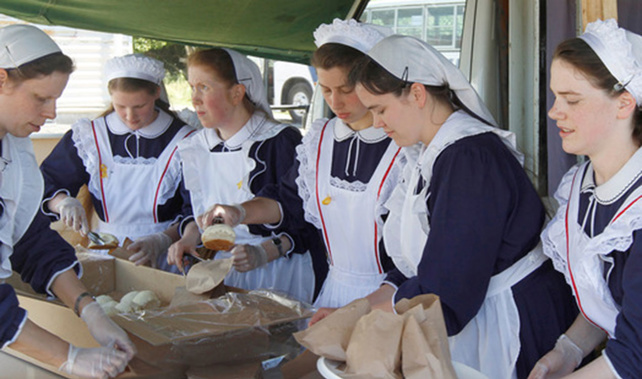
A group of ex-Gloriavale members have taken the secretive Christian community to court in a bid to determine their employment status while they lived there and ascertain whether they were wrongly exploited as workers.
Leavers Hosea Courage, Daniel Pilgrim and Levi Courage are seeking a declaration from the Employment Court around their status after they left school and worked at the commune and in Gloriavale-owned businesses during their teenage years.
The court action follows multiple inquiries into the employment status of people living and working at Gloriavale.
The Labour Inspectorate investigated in 2017 after concerns raised by Charities Services, and again in 2020, after allegations of long working hours were made by two community members.
The results of both inquiries showed that no employment relationships existed within Gloriavale as defined by New Zealand employment law - that members of Gloriavale cannot currently be considered employees.
As such, the matter falls outside of the Inspectorate's jurisdiction.
The leavers have now taken the matter to the Employment Court.
The hearing started today and is expected to continue all week.
Members of the community and former members will give evidence.
Brian Henry, representing the leavers, said the key to the case was the Gloriavale "rule book" - a document titled "What We Believe".
Every member had to sign a "declaration of faith" and vow to abide by the rules without question or hesitation.
He said the document was "a set of rules of a lifestyle hidden in the words of the bible".
However, it was "very simple to see" that it was "a lawyer-designed structure to avoid regulatory consequences".
"It has to be an employment contract," Henry said.
"The leaders control every aspect of the work ... they (the members) do the work ... and in return, they get the necessities of life - that, we say, is their remuneration."
Henry explained that at Gloriavale the leaders had total "power and control" to "an extreme extent" and members are "kept totally unworldly, and ignorant" so they did not challenge or ask questions.
"(Members) live a life of blind obedience, a life without basic human rights ... that's the degree of power and control the Shepherds have over this community," said Henry.
He said those who did not work hard were heavily punished.
The court would hear from leavers about psychological and physical abuse including beatings with "shovel handles, pick handles and hard solid wood".
"One will talk about how he could hardly walk for thee days," he said.
"This is extreme punishment, this is how they lived ... Those who will not work hard - get no food.
"Not only do they not feed them if they disobey, they make them stand up and watch everyone else eat ... they can stop you getting food - and they do - if you disobey them.
"The Shepherds have got total and absolute control over every aspect of their lives."
They could also be "shunned" - forced out of the community and separated from their family and everything they know.
"Men work for the church under the direction of the leaders ... they are the bosses and the people inside do as they are told working for them," he said.
"That is a fairly good start to say that they are employers."

The Gloriavale Christian Community is a small and isolated Christian community located at Haupiri on the West Coast. Photo / George Heard
Henry said the men he was representing worked in various jobs at Gloriavale including the piggery and honey businesses, hunting, logging and farming.
He said it was patently clear - though the case itself was complex - that the plaintiffs were employees.
"If you are a volunteer it follows that you must have the choice to go off and do something else ... that's a volunteer," he said.
"The people of Gloriavale cannot do that ... To turn around and say they freely give their time - really?
"They expect to be fed have a roof over their head, that is their reward.
"They're told to work, they go where the leaders tell them ... they cannot choose.
"We say they can't be volunteers, they have an expectation of the basics of life ... we say there can be no volunteering."
Hosea Courage: 'We had no choice'
The first of the four plaintiffs to give evidence was Hosea Courage.
He told the court he started working when he was just six.
On weekdays, all children attended school from 9-2 then went to work at jobs assigned by the leaders until dinner time.
"On Saturday, I would work from 9-6 with a short lunch break of 30 minutes," he said.
"All children were required to do the same working hours."
His first job was collecting moss or working in the community gardens.
The work was hard and the hours arduous and Courage said safety gear was not provided.
He told the court he was punished for working too slowly - once he was hit and another time he was not allowed dinner.
He said everyone including his parents were aware of the abuse and he recalled Gloriavale founder Hopeful Christian instructing adults to hit children if they disobeyed as per the Bible's instruct.
Courage left school at 15 and worked in the piggery.
He said he signed a document stating he would "get money" for working.
That money would go directly into a bank account for Gloriavale.
He signed a tax form declaring Gloriavale as his agent - but saw no money and had no personal bank account.
Courage said he was given six days of holiday a year - which he slept through due to sheer exhaustion - and had no sick leave.
He said leaders told members that if asked by anyone they were to say they were "volunteers".
"Each day I was exhausted from the long hours," he said.
"We did not have a choice ... I was smacked with a shovel handle, denied food."
Courage's parents left Gloriavale when he was 17.
A lawyer for Gloriavale challenged Courage and said it was his parents, not the community who pushed him into work.
He rejected that saying of his parents: "I do not believe the parents had a choice."
The hearing continues.
Take your Radio, Podcasts and Music with you









